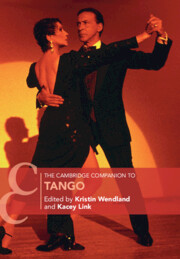Book contents
- The Cambridge Companion to Tango
- Cambridge Companions to Music
- The Cambridge Companion to Tango
- Copyright page
- Dedication
- Contents
- Figures
- Musical Examples
- Notes on Contributors
- Notes on the Text
- Acknowledgments
- Introduction: Tango Studies across Disciplinary and Geographic Boundaries
- 1 A Brief History of Tango
- Part I Tango Music
- Part II Tango Song
- Part III Tango Dance
- Part IV Interdisciplinary Tango Studies
- 14 Nineteenth-Century Afro-Argentine Origins of Tango
- 15 Synthesizing Analyses: A Choreomusical Study of “La cumparsita”
- 16 Mixed Messages: Tango and Argentine Politics
- 17 (Trans)national Visions: Tango Onscreen
- 18 Tango, Emotion, and Transculturality in the Twentieth and Twenty-First Centuries
- 19 Tango Studies Abroad: Gustavo Beytelmann and Codarts University
- 20 Tango and Healing: A Clinical Research Perspective
- Epilogue: Carrying Tango Studies into the Future
- Appendix: Tango Chronology
- Song Title Index
- Index
- References
14 - Nineteenth-Century Afro-Argentine Origins of Tango
from Part IV - Interdisciplinary Tango Studies
Published online by Cambridge University Press: 15 March 2024
- The Cambridge Companion to Tango
- Cambridge Companions to Music
- The Cambridge Companion to Tango
- Copyright page
- Dedication
- Contents
- Figures
- Musical Examples
- Notes on Contributors
- Notes on the Text
- Acknowledgments
- Introduction: Tango Studies across Disciplinary and Geographic Boundaries
- 1 A Brief History of Tango
- Part I Tango Music
- Part II Tango Song
- Part III Tango Dance
- Part IV Interdisciplinary Tango Studies
- 14 Nineteenth-Century Afro-Argentine Origins of Tango
- 15 Synthesizing Analyses: A Choreomusical Study of “La cumparsita”
- 16 Mixed Messages: Tango and Argentine Politics
- 17 (Trans)national Visions: Tango Onscreen
- 18 Tango, Emotion, and Transculturality in the Twentieth and Twenty-First Centuries
- 19 Tango Studies Abroad: Gustavo Beytelmann and Codarts University
- 20 Tango and Healing: A Clinical Research Perspective
- Epilogue: Carrying Tango Studies into the Future
- Appendix: Tango Chronology
- Song Title Index
- Index
- References
Summary
Paulina L. Alberto uses original research about a multigeneration family of Black musicians to illustrate different stages of musical experimentation that fed into tango. In doing so, she sheds new light on the relationship between the Afro-Argentine musical and dance tradition of candombes and early tango, and she challenges the entrenched racial narrative of Afro-Argentine “disappearance” over the course of the nineteenth century.
Keywords
- Type
- Chapter
- Information
- The Cambridge Companion to Tango , pp. 245 - 263Publisher: Cambridge University PressPrint publication year: 2024



